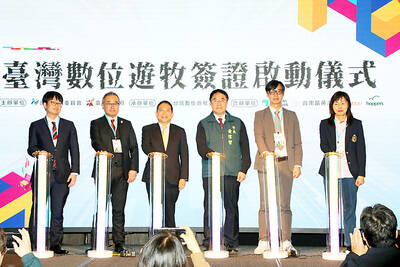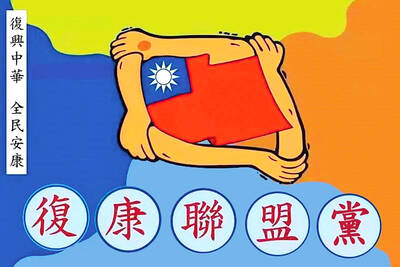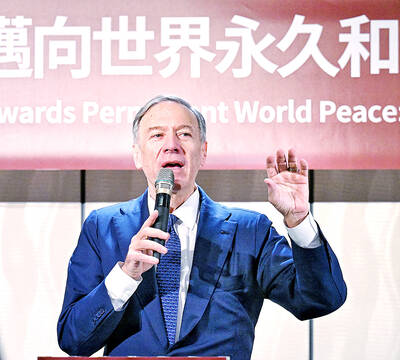The Taipei City Government yesterday announced it will relocate the Maokong Gondola system’s damaged support pillar and reported 11 city government officials and two contracting companies to the Control Yuan and the Taipei Prosecutors’ Office for further investigation into possible dereliction of their responsibilities.
Taipei Mayor Hau Lung-bin (郝龍斌) bowed and apologized to the public for the problematic system, but declined to comment on whether or not President Ma Ying-jeou (馬英九), the former Taipei mayor, should take some of the responsibility.
“I should take political responsibility for administrative negligence and I need to apologize to Taipei residents. I am sorry,” Hau said yesterday during a press conference at Taipei City Hall.
When asked by reporters whether or not former mayor Ma should also be held responsible, Hau refused to comment.
“I cannot answer that question for him,” Hau said.
The damaged support pillar, also known as Tower No. 16, will be relocated about 30m closer to Tower No. 17. The relocation project will be completed in about 11 months and will cost NT$21 million (US$620,000). The system could resume operations as early as the end of the year, Hau said.
The evaluation report was completed last month and it suggested that the city government relocate the damaged pillar. The city government had also completed a geology evaluation of the other 24 support pillars and installed monitoring devices under each to check on their stability, he said.
The city government yesterday also made public a report conducted by Taipei City Government’s Department of Government Ethics, which held 11 officials responsible for administrative negligence during the planning, construction and testing stages of the project.
With the exception of Department of Transportation Deputy Commissioner Lin Li-yu (林麗玉) and New Public Works Office Deputy Director Lin Chin-fan (林慶釩), no senior officials were mentioned in the report.
The report also blamed two contractors, CECI Engineering Consultants Inc and Chun Yuan Construction Co, for failing to complete geological drilling tests in accordance with the project plans.
Democratic Progressive Party (DPP) Taipei City councilors slammed the Government Ethics Department for sheltering Ma, Hau and other senior officials from responsibility.
“The report blamed all the problems on junior officials. Shouldn’t the decision-makers and supervising departments, including Ma, take full responsibility for starting the project?” DPP Taipei City Councilor Chuang Ruei-hsiung (莊瑞雄) said after reading the report.
In response, Presidential Office Spokesman Wang Yu-chi (王郁琦) said the decision to build the gondola had been the correct one, as it had attracted more than 5 million visitors.

QUIET START: Nearly a week after applications opened, agencies did not announce or promote the program, nor did they explain how it differed from other visitor visas Taiwan has launched a six-month “digital nomad visitor visa” program for foreign nationals from its list of visa-exempt countries who meet financial eligibility criteria and provide proof of work contracts. To apply, foreign nationals must either provide proof that they have obtained a digital nomad visa issued by another country or demonstrate earnings based on age brackets, the Bureau of Consular Affairs said. Applicants aged 20 to 29 must show they earned an annual salary of at least US$20,000 or its equivalent in one of the past two years, while those aged 30 or older must provide proof they earned US$40,000 in

SERIOUS ALLEGATIONS: The suspects formed spy networks and paramilitary groups to kill government officials during a possible Chinese invasion, prosecutors said Prosecutors have indicted seven retired military officers, members of the Rehabilitation Alliance Party, for allegedly obtaining funds from China, and forming paramilitary groups and assassination squads in Taiwan to collaborate with Chinese troops in a possible war. The suspects contravened the National Security Act (國家安全法) by taking photos and drawing maps of key radar stations, missile installations and the American Institute in Taiwan’s headquarters in Taipei, prosecutors said. They allegedly prepared to collaborate with China during a possible invasion of Taiwan, prosecutors said. Retired military officer Chu Hung-i (屈宏義), 62, a Republic of China Army Academy graduate, went to China

AIR DEFENSE: The Norwegian missile system has proved highly effective in Ukraine in its war against Russia, and the US has recommended it for Taiwan, an expert said The Norwegian Advanced Surface-to-Air Missile Systems (NASAMS) Taiwan ordered from the US would be installed in strategically important positions in Taipei and New Taipei City to guard the region, the Ministry of National Defense said in statement yesterday. The air defense system would be deployed in Taipei’s Songshan District (松山) and New Taipei City’s Tamsui District (淡水), the ministry said, adding that the systems could be delivered as soon as the end of this year. The US Defense Security Cooperation Agency has previously said that three NASAMS would be sold to Taiwan. The weapons are part of the 17th US arms sale to

UNITY MESSAGE: Rather than focusing on what Trump said on the campaign trail about Taiwan, Taipei should be willing to engage with the US, Pompeo said Taiwan plays a key role in Washington’s model of deterrence against China, former US secretary of state Mike Pompeo said in a speech in Taipei yesterday. During US president-elect Donald Trump’s first term, “we had developed what we believe was a pretty effective model of deterrence against adversaries who wanted to undermine the set of rules and values that the people of Taiwan and the people of the US hold dear,” Pompeo said at a forum organized by the Formosa Republican Association. “Succeeding in continuing to build this model will not solely rest at the feet of president Trump and his team,